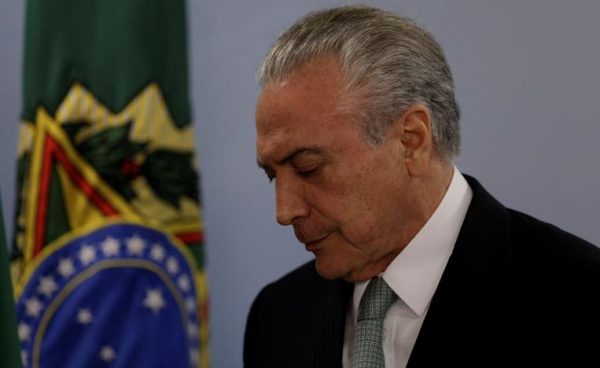
SAO PAULO (AP) — A day after Brazil’s top prosecutor formally accused President Michel Temer of corruption in a scathing indictment, markets largely shrugged off the news Tuesday in a sign that the leader’s departure may not be imminent.
In sharp contrast to the nosedive that the Brazilian real currency and stocks took when accusations of corruption against Temer surfaced in May, the benchmark Bovespa was trading even on Tuesday, while the real fell 0.8 percent against the dollar.
Late Monday, Attorney General Rodrigo Janot filed a 64-page indictment with the Supreme Federal Tribunal that accuses Temer of corruption for allegedly accepting bribes from an executive at a major meatpacker in exchange for help influencing the decisions of state bodies. The document is blistering in its assessment of Temer, saying he showed a total disregard for his office and that his actions — including secret meetings not on his official calendar — showed he was trying to cover up “criminal actions.”
Janot’s indictment was widely expected — which could explain the lukewarm reaction of investors — but the accusations themselves have roiled Brazilian politics since the details that underpin them began to emerge last month, raising questions about whether Temer will finish out his term, which ends next year.
Temer is also under investigation for obstruction of justice and criminal conspiracy, and Janot is expected to file those charges in the coming days.
The president has yet to respond officially to the indictment. He is also under pressure from tanking popularity and numerous calls for him to step down.
“Temer managed, in less than a year in office, to organize a criminal enterprise, obstruct justice and become the first president in office to be accused of corruption,” said Sen. Fatima Bezerra of the opposition Worker’s Party.
Temer has denied the allegations and said he will not resign, but will instead fight the charges.
In fact, the charges give Temer an incentive to hang on to office for as long as possible, according to Mauricio Santoro, a political scientist at state University of Rio de Janeiro. As a sitting president, only the Supreme Federal Tribunal, the country’s highest court, can try or jail Temer.
If he leaves office, he would be tried in lower courts that may move faster and offer less deference.
“If Temer resigns this week, he could be in jail next week,” said Santoro.
“Even though the president is clearly weaker than he was before, he still has enough political capital to fend off any threat to his presidency,” the Eurasia consultancy said in a note. “Lawmakers are unwilling to jump the Temer government’s ship when there is no clear ship to jump to.”
Temer, who took over in May of last year after President Dilma Rousseff was impeached and later removed from office, has the lowest approval rating of a president since 1989.
The Datafolha polling institute showed over the weekend that just 7 percent of those questioned approved of Temer’s administration, the worst since the country was embroiled in a crisis of hyper-inflation on the watch of President Jose Sarney.
The Associated Press.

Leave a Reply
You must be logged in to post a comment.